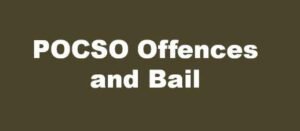POCSO Offences and Bail: A Complete Legal Overview
POCSO Offences and Bail ensure child protection through strict punishments, bailable provisions on judicial discretion with victim safeguards.
POCSO Offences and Bail: A Complete Legal Overview
Understanding POCSO Offences
The Protection of Children from Sexual Offences (POCSO) Act, 2012 safeguards minors and prevents sexual abuse, exploitation, and harassment through strong legal actions.
The Act defines a child as any individual below eighteen years and ensures full protection against all forms of sexual harm.
Authorities criminalize penetrative sexual assault, sexual harassment, and pornographic exploitation of children, holding offenders strictly accountable for their conduct.
Special Courts under the POCSO Act conduct speedy and child-friendly trials to ensure justice and prevent further trauma to victims.
Lawmakers emphasize mandatory reporting of offences and impose severe penalties on persons who conceal information about sexual crimes.
Authorities prosecute both male and female offenders under POCSO, ensuring gender-neutral justice and protection for every affected child.
Law enforcement officers undergo specialized training to handle POCSO investigations sensitively, preserving children’s dignity and privacy throughout the process.
Legal Classification of POCSO Offences
Authorities classify POCSO offences as aggravated or non-aggravated, depending on the crime’s severity and surrounding circumstances.
Aggravated offences involve individuals holding trust or authority, including police officers, teachers, doctors, or relatives of the child victim.
Courts may impose rigorous imprisonment for life or death penalties in cases involving aggravated penetrative sexual assault under the Act.
Non-aggravated offences attract imprisonment from seven years to life, depending on the nature and seriousness of the assault.
The Act punishes persons who attempt or abet sexual offences, treating them with the same seriousness as completed offences.
Authorities treat all POCSO offences as cognizable and non-bailable, enabling Special Courts to handle these sensitive matters expeditiously.
Courts ensure every POCSO trial concludes within one year from the date of cognizance to prevent unnecessary delays in justice.
Bail Provisions under POCSO Act
The POCSO Act places strict restrictions and prevents easy granting of bail to offenders accused of crimes against children.
Judges exercise caution while deciding bail, protecting victims’ safety, ensuring witness security, and maintaining faith in the justice system.
High Courts or Sessions Courts grant bail under Section 439 of CrPC after assessing evidence and case circumstances thoroughly.
Judges rarely grant bail in aggravated offences unless they find exceptional reasons supported by credible and strong evidence.
Prosecutors oppose bail applications actively, highlighting threats of evidence tampering or intimidation of the child victim.
Judges consider the gravity of the offence, age of the victim, and the accused’s influence before deciding any bail application.
Courts impose strict conditions like restricted movement, periodic reporting, and zero contact with victims while granting bail.
Judicial Interpretation on Bail in POCSO Cases
Indian courts emphasize child welfare and prioritize protection of victims over the liberty and convenience of the accused persons.
The Supreme Court directs lower courts to deny bail if risks of witness intimidation or evidence manipulation appear likely.
High Courts reaffirm that minor inconsistencies in victim statements do not justify bail in serious sexual offence cases.
Courts prioritize the victim’s mental and emotional well-being, preventing any contact that may retraumatize or distress the child.
Judicial discretion under POCSO remains restricted, as child safety and deterrence stand as the law’s highest objectives.
Lawmakers designed the Act to deter offenders by limiting bail opportunities and enforcing severe punishments for child exploitation.
Judges maintain a balance between individual liberty and society’s duty to protect children while deciding bail applications.
Procedural Safeguards for Victims
The POCSO Act establishes extensive safeguards to protect children’s identities, privacy, and mental health during investigations and trials.
Police officers record victims’ statements at home or other child-friendly locations to ensure comfort and avoid intimidation.
Judges regulate cross-examinations to prevent humiliation, harassment, or unnecessary questioning that may traumatize the victim.
Special Courts conduct in-camera proceedings to maintain confidentiality and prevent exposure of the victim’s identity.
Doctors conduct medical examinations respectfully in the presence of a trusted adult to protect the child’s dignity.
Authorities ensure psychological counseling and emotional support for child victims to help recovery and social reintegration.
Normally in many POCSO cases Special Court does not grant bail in POCSO cases, However, individual should file bail application before High Court through criminal lawyer in Jaipur.
Government agencies provide compensation and financial assistance to victims for rehabilitation, education, and healthcare needs.
Frequently Asked Questions (FAQs)
What is the main objective of the POCSO Act?
Lawmakers enacted the POCSO Act to protect children below eighteen from sexual abuse through stringent procedures and strict punishments.
Are POCSO offences bailable?
No, authorities treat all POCSO offences as non-bailable, requiring judicial discretion before granting any bail.
Can anticipatory bail be granted in POCSO cases?
Courts rarely grant anticipatory bail in POCSO matters due to the seriousness of offences and victim protection concerns.
Who can report a POCSO offence?
Any person aware of a sexual offence against a child must report it immediately to the police or Special Juvenile Unit.
What is the time limit for POCSO trial completion?
Courts must complete every POCSO trial within one year from the date of cognizance to ensure timely justice.
Can a minor accused be tried under POCSO Act?
Authorities try minor accused persons under the Juvenile Justice Act instead of the POCSO Act provisions.
How are victims protected during trial?
Courts protect victims by conducting in-camera trials, hiding their identities, offering counseling, and controlling cross-examinations.

